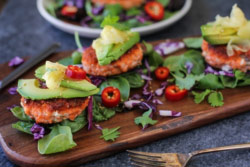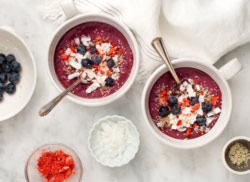We need to talk about a Healthy Gut! There are many ways that we have been taught to treat symptoms of anxiety and depression. Meditation and mindfulness. Yoga and exercise. Talk therapy and medication.
Each of these tactics have their merits, and can be greatly effective in alleviating the often-debilitating symptoms of mental illness. But one key element of emotional maintenance is often forgotten – your diet.
So often we think of healthy, balanced eating as simply a weight-loss method. But what if the path to a peaceful and serene way of life was to simply choose a more mindful approach to our diet.
“A very large body of evidence now exists that suggests diet is as important to mental health as it is to physical health,” says Felice Jacka, president of the International Society for Nutritional Psychiatry Research. “A healthy diet is protective and an unhealthy diet is a risk factor for depression and anxiety.”

Neurotransmitter Balance
Everything we do relies on neurons communicating with one another. Electrical impulses and chemical signals carrying messages across different parts of the brain, and between the brain and the rest of the nervous system. Neurotransmitters help to send chemical messages between neurons.
There are four main neurotransmitters that can have a major effect on our mental health:
- Serotonin: Perhaps the most talked about neurotransmitter, Serotonin helps control many key functions of the body and brain, such as mood, appetite and sleep.
- Dopamine: Mainly involved in controlling movement and aiding the flow of information to the front of the brain, which is linked to thought and emotion.
- GABA (Gamma-Aminobutyric Acid): Often referred to as “nature’s Valium,” GABA’s primary function is to reduce the activity of the neurons to which it binds. This serves to control the sense of fear or anxiety experienced when neurons are overexcited.
- Norepinephrine: A naturally occurring chemical in the body, Norepinephrine acts as both a stress hormone and neurotransmitter. As part of the body’s response to stress, the chemical can affect the way the brain pays attention and responds to events, increasing alertness and speeding reaction time.
Now that we know what causes these shifts in emotional health, we can begin to control them. Below we will detail a handful of foods and vitamins that can help increase and maintain these four important chemicals, as well as some delicious recipes to help you get started on your way to a happy stomach.
Omega-3 Fatty Acids
Our brains are made up largely of fat, and our bodies are unable to naturally produce essential fatty acids on its own. A diet heavy in Omega-3s can help boost production of both serotonin and dopamine in our bodies, resulting in an elevated mood, energy and overall brain function.
Omega-3 Foods to Try:
- Cold-Water Fatty Fish: Salmon, Mackerel, Sardines, Herring
- Flax-Seed Oil
- Chia Seeds
- Walnuts
- Spinach
- Avocado
- Soy
Probiotic-Rich Foods For a Healthy Gut
Fermented foods naturally contain probiotics that help establish a normal balance between good and bad bacteria in your intestines. An overabundance of bad bacteria can have numerous negative effects on your brain including lowering serotonin levels and causing depression.
Probiotic Foods to Try:
- Yogurt
- Kefir
- Kimchi
- Kombucha
- Pickled Vegetables
Whole Grains For That Happy Gut
The primary source of energy for the brain is glucose, which comes from carbohydrates. Simple carbs exacerbate low mood by creating spikes in blood sugar. By contrast, complex carbs release glucose slowly, helping us feel full longer and providing a steady source of fuel for the brain and body.
Whole Grain Foods to Try:
- Whole-wheat products
- Bulgur
- Oats
- Wild rice
- Barley
- Beans
Leafy Greens
Recent studies have shown that leafy greens – a rich source of fiber and other important nutrients – can help prevent age-associated cognitive decline, boosting mental alertness and functions closely associated with depression and anxiety disorders. When ingested, Lutein, a pigment found in leafy greens, plays a “neuroprotective role” and may contribute to lifelong brain health.
Leafy Green Foods to Try:
- Kale
- Spinach
- Dandelion Greens
- Romaine
- Broccoli
- Brussel Sprouts
- Mustard Greens
- Turnip
Healthy Gut Diet Recipes
Now for the fun part. We’ve scoured our favorite food blogs and forums to find five recipes that will help kick-start your culinary wellness journey. Bon Appetite!

Tomato and Black Bean Guacamole for One from Brit & Co.

Lentils Folded into Yogurt, Spinach, and Basil from 101 Cookbooks

Asian Salmon Burgers from The Roasted Root

Vegan Chocolate-Almond Chia Pudding

Berry Superfood Smoothie Bowls from Love and Lemons

How to Make Easy Kimchi at Home from The Kitchn
Eating a healthy diet is so important for the gut, and in turn the brain and good mental health.
In addition to eating plenty of healthy gut foods, it’s also necessary to stay away from inflammatory foods that increase inflammation in the body and can cause infection.
Related Posts
- Addictive Personality Disorder
The last decade has seen an increase in reported cases of substance abuse. Behavioral addictions…
- Jobs for People with Anxiety - Low Stress Jobs
Some of the best jobs for people with anxiety are low stress jobs that involve…
